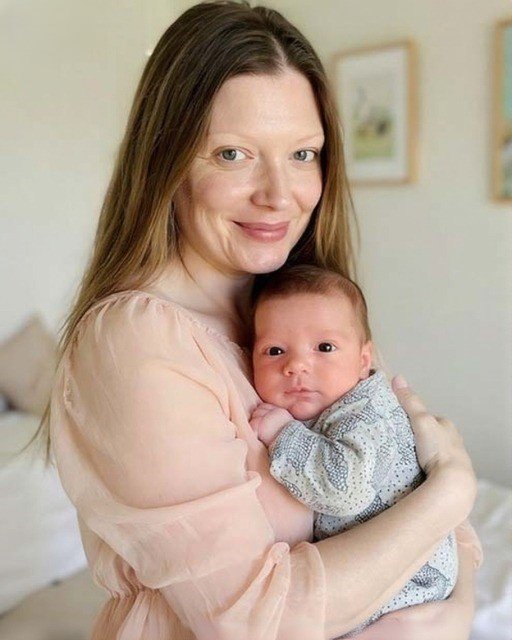You modern girls and your drama! In my day, we didn’t run to doctors for every sneeze.”
Before I could respond, Kiran appeared, his eyes tired. “What’s going on?”
I turned to him helplessly.
“He’s not getting better, Kiran. I think we should take him in—”
“She’s exaggerating again,” his mother snapped. “You’ve spoiled her.
Always listening to her nonsense.”
Kiran looked between us, his jaw tightening. “It’s one in the morning, Hera. Maybe just wait till morning, okay?”
I couldn’t believe what I was hearing.
“He’s your son, Kiran! He’s burning up!”
That was when his father stormed in. “Enough!
We’re tired of your constant complaining, Hera. Always making problems, always disrespecting this household.”
I felt my chest tighten. “I’m just trying to take care of my child—”
“Our family doesn’t need this kind of woman,” he interrupted coldly.
“You want to go to the hospital? Then go. But don’t come back.”
I blinked, stunned.
“What?”
My mother-in-law’s voice was sharp. “You heard him. Take your things and leave.
If you think you can do better without us, then prove it.”
I looked at Kiran, desperate for him to speak up. He just stood there, silent. Not one word in my defense.
Tears burned my eyes as I held my baby tighter. “You’re really going to let them do this?”
He looked away. “Maybe it’s better if you stay somewhere else for a while.
Everyone needs space.”
Space. That was his word for it. So there I was, barely a week after giving birth, standing on the front porch in my nightgown with a sick newborn in my arms, as my in-laws slammed the door behind me.
The taxi driver who took me to the hospital didn’t ask many questions; maybe he saw too much to be surprised anymore. Aarav was admitted right away; he had a viral infection and needed to be monitored overnight. The doctor told me if I’d waited until morning, it could’ve been far worse.
I sat there in that sterile hospital room, exhausted, angry, and heartbroken. Not just at my in-laws but at Kiran. The man who’d vowed to protect me had stood by and watched his parents throw me and our son out like garbage.
I knew then that I couldn’t go back. The next few weeks were a blur of hospital visits, paperwork, and long nights alone. I stayed in a small women’s shelter for a while until a friend from college, Meera, offered me a room in her apartment.
She helped me get on my feet again she even found me a part-time design job that I could do from home. Slowly, painfully, I began to rebuild. Aarav got better.
He smiled again. And every time I looked at him, I reminded myself why I couldn’t give up. Meanwhile, Kiran’s calls started coming.
At first, he sounded guilty. “I’m sorry, Hera. I didn’t mean for it to go that far.
They were just angry.”
I stayed quiet. “Just come back,” he pleaded. “We’ll figure it out.”
But I didn’t.
Because I knew “figuring it out” meant me returning to the same prison I had escaped. When he realized I wasn’t coming back, his tone changed. He grew cold, distant.
“You’re breaking up the family, Hera. Do you really want Aarav to grow up without a father?”
That hurt, but I refused to be manipulated. Months passed.
I filed for custody, then for divorce. It wasn’t easy; his parents fought tooth and nail to make me look unfit. They told the court I was unstable, that I had “abandoned” their son, that I was poisoning their grandchild against them.
But the truth was on my side. I had hospital records, messages, and even the shelter’s report proving I had been forced out with a newborn. When the judge saw that, he granted me full custody.
I thought that would be the end of it. But fate has a funny way of settling debts. About a year later, I received a call from an unknown number.
When I answered, a frail voice came through my mother-in-law’s. “Hera…” she began, her voice trembling. “Please.
I know you have no reason to talk to me, but I need your help.”
I hesitated. “What happened?”
There was a long pause. “Kiran.
He’s in the hospital.”
My heart skipped a beat. “What?”
She explained that Kiran had been in a car accident. He had broken his leg and was in bad shape.
Their business had also been struggling; a bad investment had drained most of their savings. They were drowning in debt. “You’re his wife,” she said quietly.
“You should come.”
I didn’t answer right away. Part of me wanted to hang up after everything they’d done, after the way they’d h.u.m.i.l.i.a.t.3.d me. But another part of me, the part that still remembered the man I once loved, couldn’t turn away completely.
So I went. When I entered that hospital room, Kiran looked nothing like the man I married. He was thinner, paler, his face etched with regret.
“Hera,” he whispered. “You came.”
I stood by the door, my son clutching my hand. “Only because Aarav deserves to know his father.”
Tears filled his eyes.
“I’m sorry. For everything. I should’ve stood up for you.”
For a long time, I didn’t speak.
Then, softly, I said, “Yes. You should have.”
His parents sat silently in the corner, shame written all over their faces. For the first time, they looked small.
Mrs. Patel finally spoke. “We were wrong, Hera.
I see that now. You were a good wife, a good mother. We treated you terribly.
And we lost our son’s happiness because of it.”
I looked at her, the same woman who’d once told me I wasn’t fit to raise her grandchild, and I saw not arrogance, but defeat. “You didn’t just lose his happiness,” I said quietly. “You lost a family that could’ve loved you.”
After that, I didn’t cut them off completely, but I didn’t open my heart to them again either.
I let Kiran visit Aarav when he recovered, but always under supervision. Over time, he became a better father, though our marriage was beyond saving. We finalized the divorce a few months later.
The Patels tried to mend things; they’d send gifts for Aarav’s birthdays, call occasionally, and even apologize again. But trust, once shattered, isn’t easily rebuilt. Years later, when Aarav turned six, I opened my own design studio.
It was small at first, but it grew quickly. I hired a few women from the same shelter I’d stayed in, women who, like me, had been pushed out with nowhere to go. I wanted to give them what I never had: a safe start.
One day, Mrs. Patel showed up at my studio. She looked older, frailer.
She brought a small box with her — inside was a gold necklace, one she’d worn for decades. “This belonged to my mother,” she said softly. “I want you to have it.
For Aarav.”
I looked at the necklace, then at her. “Why now?”
She sighed. “Because I’ve spent too many years realizing that pride destroys families.
I can’t undo what I did, but I can hope you’ll forgive me one day.”
I didn’t say yes. I didn’t say no. I just nodded and took the box, because forgiveness, I’d learned, doesn’t always mean reconciliation.
Sometimes, it just means letting go of the pain. Looking back now, I see that being kicked out that night wasn’t the end of my world — it was the moment I began to build a new one. If they hadn’t thrown me out, I might never have found the strength to stand on my own.
I might never have created a home filled with real love instead of fear. And as for my in-laws — they learned the hardest lesson of all. You can control someone for a while.
You can crush their spirit, silence their voice, even throw them out into the cold. But if that person finds their strength, they will rise — and when they do, the ones who pushed them down will be left to live with their own regret. Because in the end, they didn’t just lose me.
They lost the chance to ever be part of the life I built — one filled with peace, love, and the very thing they tried to take away from me: freedom.





